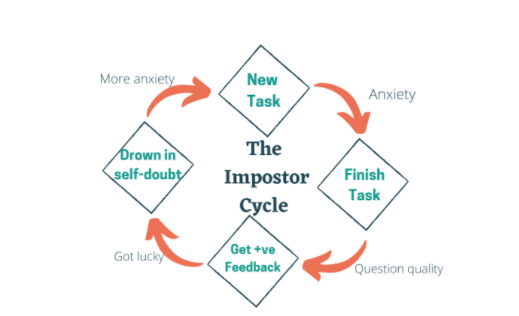Having a career in tech, especially as a woman, is not always easy. The tech field is one of the most competitive and rapidly developing fields. Being a part of such a field can leave you sometimes wondering, doubting yourself, your abilities, and your intelligence.
All of us experience periods of self-doubt from time to time; it usually peaks when we attempt to do something new or learn something challenging. Sometimes, a little self-doubt is not bad; it could often be the motivation we need to achieve our goals. However, having this feeling of self-doubt all of the time is a different story. Especially when you feel incapable of completing your tasks or even unworthy of your previous achievements. That is “Imposter Syndrome.“
The term Imposter Syndrome’s first appearance was in 1978 in the article “The Impostor Phenomenon in High Achieving Women: Dynamics and Therapeutic Intervention” by Dr. Pauline R. Clance and Dr. Suzanne A. Imes. After that, the term and feeling associated with it have been used and studied throughout the years. Some studies show that around 70% of the population suffers from Imposter Syndrome.

Image made by Sara using canva
Dealing with Imposter Syndrome is being stuck in a loop called “The Impostor Cycle“. This loop is the same for anyone who struggles with imposter syndrome. That loop gets engaged when you start working on a new task or learn something new, which triggers your anxiety, making you think, “I can’t do this, it’s way too complicated, and/ or I am not smart enough”. Thinking like this leads to procrastination, which increases your anxiety levels even more. You will eventually finish the task, probably not satisfied with the quality of your work, and once you’re given a new one, the cycle starts again.
The only way to break the cycle and defeat the imposter feeling within is to get to the bottom of why you think that way and work through the feeling. You can do that by following these three steps:
No.1: Know your competence type
Imposter Syndrome is not constant among all who feel it; it differs based on the person’s personality, upbringing, and life experiences.
Dr. Valerie Young discovered that the Imposter Syndrome is directly correlated to one’s definition of competence. How one defines competence suggests how competent that person will end up feeling.
She categorised competence into five types:
- The Perfectionist: Perfectionists always tend to set an impossibly high bar for themselves, and when they don’t reach that bar, they end up doubting their abilities and self-worth.
- The Superpeople: This group of people measures their success, competence, and self-worth based on “how many” roles, responsibilities, and tasks they can handle at the same time.
- The Soloist: Soloists believe in the “who,” they only consider achievements they did independently. They don’t like to ask for help and view it as a weakness. But, for them, asking for help strengthens the symptoms of the Imposter Syndrome even more.
- The Expert: Experts are the brainy versions of perfectionists; they view competence from the perspective of “how much” do I know about my field, job, or task.
- The Natural Genius: This group views competence from the perspective of “how long.” They feel accomplished when they learn a new thing or finish a task in a relatively short time.
Once you define competence and how you view your self-worth, it becomes easier for you to understand the roots of your imposter syndrome and work on overcoming it.
No.2: Find a Community
One of the best ways to work on your confidence and self-esteem is having a community that supports and encourages you to reach your full potential. Luckily, there are various online, global communities for women in tech to support, encourage and inspire each other. Furthermore, when you know your competence type, you will want to share your experience with others who have been through the same journey. Being a part of such communities will offer you precisely that.
These communities are also a great place to ask for advice when needed.
Asking for help doesn’t mean you are incompetent or less intelligent. Be honest about your knowledge: it can be empowering to admit that you don’t know everything, but that you’re constantly developing yourself.
N0.3: Learn to be comfortable with being uncomfortable
 Finally, one of the most critical mindsets in any field is being comfortable with uncertainty and not knowing. It is perfectly normal not to know everything; no one does nor expects you to. So embrace that and teach yourself to push through your fears. Anyone can overcome their fear of something by just going ahead and doing it, and then keep on doing it till you master it; hard work is the only way; there are no shortcuts.
Finally, one of the most critical mindsets in any field is being comfortable with uncertainty and not knowing. It is perfectly normal not to know everything; no one does nor expects you to. So embrace that and teach yourself to push through your fears. Anyone can overcome their fear of something by just going ahead and doing it, and then keep on doing it till you master it; hard work is the only way; there are no shortcuts.
Conclusion
In the end, remember that we all go through times when we feel like imposters, with no self-esteem or confidence. So whenever you feel that way, stop and start redefining how you view “competence,” be patient and kind to yourself, give yourself compliments. Control the internal dialogue with yourself that you keep repeating. Finally, know that the only way out of the Imposter Syndrome feeling is through it!
 AUTHOR: Sara A Metwalli
AUTHOR: Sara A Metwalli
– SheCanCode Blog Squad







